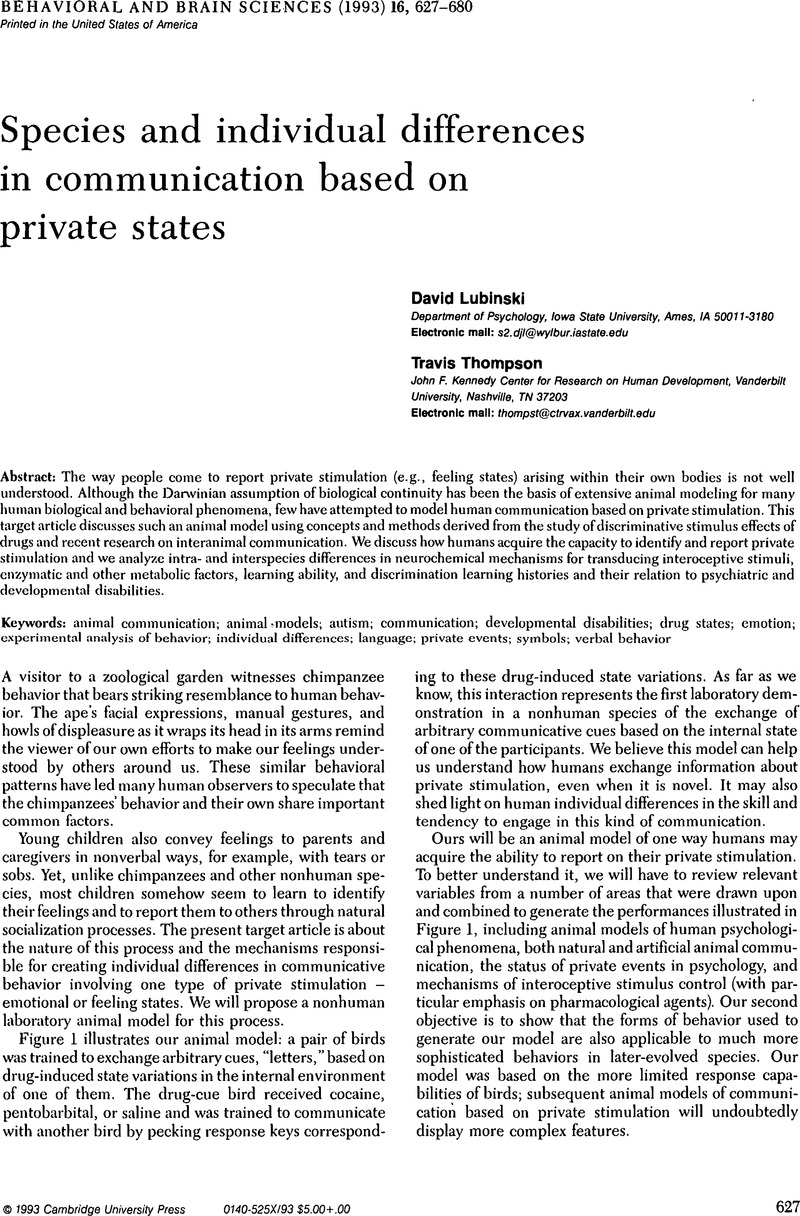Crossref Citations
This article has been cited by the following publications. This list is generated based on data provided by Crossref.
Morton, Adam
1996.
But what is the intentional schema?.
Behavioral and Brain Sciences,
Vol. 19,
Issue. 1,
p.
133.
Povinelli, Daniel J.
Zebouni, Mia C.
and
Prince, Christopher G.
1996.
Ontogeny, evolution, and folk psychology.
Behavioral and Brain Sciences,
Vol. 19,
Issue. 1,
p.
137.
Allen, Colin
1996.
Comparative cognitive studies, not folk phylogeny, please.
Behavioral and Brain Sciences,
Vol. 19,
Issue. 1,
p.
122.
Mitchell, Robert W.
1996.
Self-knowledge, knowledge of other minds, and kinesthetic-visual matching.
Behavioral and Brain Sciences,
Vol. 19,
Issue. 1,
p.
133.
Olson, David R.
and
Homer, Bruce
1996.
Understanding that looking causes knowing.
Behavioral and Brain Sciences,
Vol. 19,
Issue. 1,
p.
135.
Nelson, Katherine
1996.
Four-year-old humans are different: Why?.
Behavioral and Brain Sciences,
Vol. 19,
Issue. 1,
p.
134.
Gomez, Juan Carlos
1996.
Second person intentional relations and the evolution of social understanding.
Behavioral and Brain Sciences,
Vol. 19,
Issue. 1,
p.
129.
Slater, Carol
1996.
Are blind babies delayed in achieving social understanding?.
Behavioral and Brain Sciences,
Vol. 19,
Issue. 1,
p.
141.
Ze'ev, Aaron Ben
and
Oatley, Keith
1996.
Development of social emotions and constructive agents.
Behavioral and Brain Sciences,
Vol. 19,
Issue. 1,
p.
124.
Gallup, Gordon G.
1996.
Rhesus monkeys are radical behaviorists.
Behavioral and Brain Sciences,
Vol. 19,
Issue. 1,
p.
129.
Hobson, R. Peter
1996.
Understanding minds and selves.
Behavioral and Brain Sciences,
Vol. 19,
Issue. 1,
p.
132.
Barresi, John
and
Moore, Chris
1996.
Intentional relations and social understanding.
Behavioral and Brain Sciences,
Vol. 19,
Issue. 1,
p.
107.
Barresi, John
and
Moore, Chris
1996.
Understanding self and other.
Behavioral and Brain Sciences,
Vol. 19,
Issue. 1,
p.
142.
Baron-Cohen, Simon
1996.
Can children with autism integrate first and third person representations?.
Behavioral and Brain Sciences,
Vol. 19,
Issue. 1,
p.
123.
Heyes, C. M.
1996.
Imagination and imitation: Input, acid test, or alchemy?.
Behavioral and Brain Sciences,
Vol. 19,
Issue. 1,
p.
131.
Reddy, Vasudevi
1996.
Omitting the second person in social understanding.
Behavioral and Brain Sciences,
Vol. 19,
Issue. 1,
p.
140.
Dwyer, Susan
1996.
Moral competence is cognitive but (perhaps) nonmodular.
Behavioral and Brain Sciences,
Vol. 19,
Issue. 1,
p.
128.
Budwig, Nancy
and
Bamberg, Michael
1996.
Language and its role in understanding intentional relations: Research tool or mechanism of development?.
Behavioral and Brain Sciences,
Vol. 19,
Issue. 1,
p.
125.
Premack, David
and
Premack, Ann James
1996.
Intentional schema will not do the work of a theory of mind.
Behavioral and Brain Sciences,
Vol. 19,
Issue. 1,
p.
138.
Church, Jennifer
1996.
An ambiguity.
Behavioral and Brain Sciences,
Vol. 19,
Issue. 1,
p.
126.



